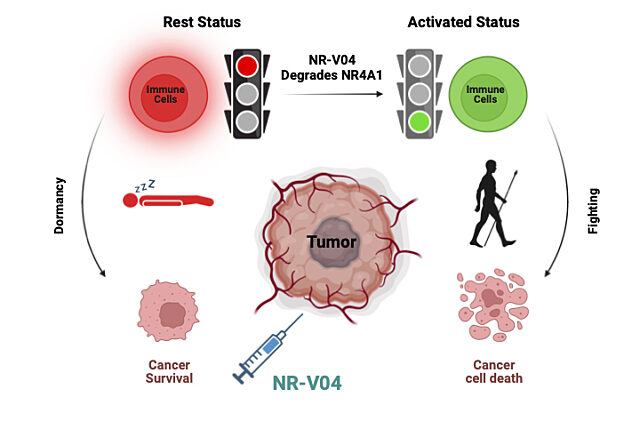Novel compound opens new avenue in immunotherapy treatment for cancers

An illustration of how the new compound works to attack cancer cells.
A team of UF Health Cancer Center researchers have developed a first-of-its-kind compound that could open a new avenue for using immunotherapy to treat various types of cancer.
In laboratory and mouse testing in skin and colorectal cancer models, the compound slowed the growth of established tumors by unleashing the body’s own immune system to attack cancer cells and, in some cases, eradicated the tumors.
“After an extensive drug discovery process and thorough testing, our data indicate that this novel compound may be more effective as a single agent than current immunotherapy treatments,” said Weizhou Zhang, Ph.D., the Dr. and Mrs. James Robert Spencer Professor of Pathology in the department of pathology, immunology and laboratory medicine in the UF College of Medicine and senior author of the study, published on Feb. 9 in the Journal of Experimental Medicine. “Ultimately, this small-molecule-based therapy could complement existing immunotherapy treatments, providing new options for patients who are resistant or do not respond to immunotherapy.”
Immunotherapy is among the most groundbreaking developments in cancer treatment, but only about 20% to 40% of patients respond to it.
The UF Health researchers first identified an intracellular protein target in the tumor microenvironment, called nuclear receptor subfamily 4 group A member 1, or NR4A1. Research has shown that the protein contributes to tumor development and plays a vital role in suppressing the immune system’s ability to battle cancer.
Next, by collaborating with medicinal chemists in the lab of Guangrong Zheng, Ph.D., a professor in the department of medicinal chemistry in the UF College of Pharmacy, the researchers developed a type of compound called a proteolysis-targeting chimera, or PROTAC, to target NR4A1.
PROTACs have emerged as promising cancer treatments because they selectively get rid of tumor-promoting proteins in cells by activating cellular protein destruction machinery.
“Our PROTAC effectively degrades NR4A1 within hours of treatment in laboratory testing and has a sustained effect for at least four days in mouse models, indicating that it could have a long-lasting therapeutic benefit,” said Zhang, a member of the UF Health Cancer Center’s Immuno-Oncology and Microbiome research program. “The PROTAC functions similarly to immune checkpoint inhibitors, the major type of immunotherapy, by essentially releasing the brakes on the body’s immune cells so they go after cancerous cells.”
The new PROTAC, called NR-V04, has several advantages over traditional antibody-based immunotherapy, the researchers said. Because it targets proteins inside cells rather than surface proteins, it has the potential to treat patients who do not respond to current immunotherapy.
Additionally, as a small chemical, it can access the tumor microenvironment — the ecosystem that surrounds the tumor — more easily than other types of drugs. Unlike most existing immunotherapy treatments that target one cell type, the new PROTAC affects multiple types of immune cells.
The team’s PROTAC was safe and effective in mouse models, said Lei Wang, M.S., a graduate student in Zhang’s lab and co-first author of the new study with Yufeng Xiao, Ph.D., a research assistant scientist in the department of medicinal chemistry.
The team is working to further enhance the compound’s effectiveness. They have patented the drug technology and plan to move forward with licensing and drug development, with the goal of developing a clinical candidate.
The research team also included collaborators at Moffitt Cancer Center and UT Health San Antonio. The study was funded in part by the Department of Defense and Sanofi, a drug development company.
About the author
